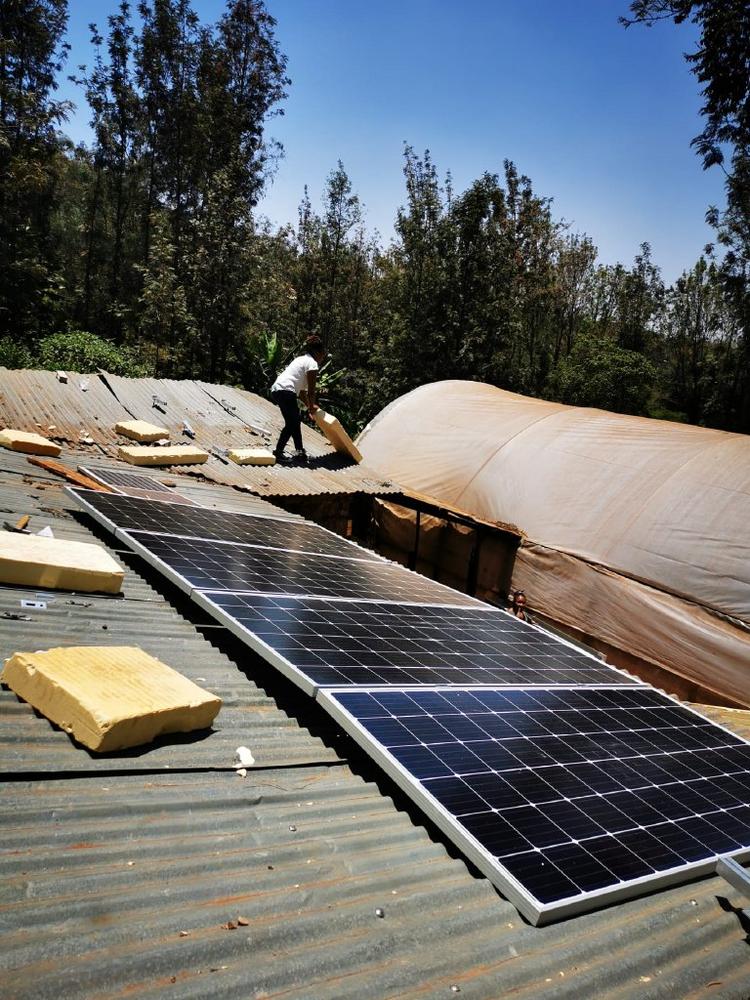Solar power provides cooling for fish, herbs and milk in Kenya

Breaking News:
Kathmandu Nepal
Samstag, Apr 27, 2024

In the process, three solar-powered cooling systems were commissioned together with farmer cooperatives, which now cool agricultural products such as milk, fish, vegetables and herbs. The installations were accompanied by technical training at Strathmore University’s Solar Center.
The rural population in Kenya is largely dependent on agriculture. Still, much of the agricultural produce is produced by smallholder farmers in rural areas, who often have no or very limited access to the electricity grid. These farmers therefore have few options for cooling their produce, resulting in significant post-harvest losses. With appropriate solar-powered cooling systems, smallholder farmers can increase their productivity, earn higher incomes, and improve food security.
This is where the PV Cool Kenya project came in. Three demonstration systems based on the SelfChill concept were installed. A solar-powered milk cooling tank with a capacity of 500 liters cools evening milk from a farmer cooperative in Bungoma until collection the next morning. An ice maker supplies 5kg ice blocks to local fishermen on Lake Victoria. On a farm in Thika, a cold room keeps harvested fruit and herbs fresh until collection for further distribution. This reduces post-harvest losses for smallholder farmers and increases income.
A modular approach to solar cooling systems
These SelfChill cooling systems have been optimally adapted to operate in the tropics and to meet the needs of smallholder farmers, farm cooperatives and small-scale processors in rural Africa. Phaesun and Solar Cooling Engineering, a spin-off company of the University of Hohenheim, have been developing the modular approach since 2013. SelfChill is based on the use of core components called cooling units, which are powered by solar modules to generate the cold. The cold is then stored in the form of frozen water in an ice storage unit and can be used for various applications, such as the milk tank or the cold room.
Sonja Mettenleiter, an agricultural engineer at Solar Cooling Engineering, reports, "During my studies at the University of Hohenheim, I helped develop the SelfChill milk cooling systems. Now I was able to install the first systems in the field in Kenya together with local partners. And indeed, the farmers are enthusiastic about the technology and you can see a direct benefit through the increased income!"
Successful project implementation despite Corona crisis
The PV Cool Kenya project started in the Corona year 2020 and has now been completed in June 2022. In the first year of the project, no travel to Kenya could take place. On the campus in Kenya, everything was done through online courses, hands-on trainings with presence of the participants were not allowed. In addition, chaos in international freight traffic caused delays in deliveries of core components for the cooling systems.
After some online events and trainings in the first project year, the second year was characterized by direct exchange, motivated training participation and joint installations of the Kenyan and German teams.
Florian Martini, project engineer at Phaesun, emphasizes: "We quickly learned that digital communication can help us enormously, but does not replace personal contact. We are extremely grateful for the initiative and great motivation of the Kenyan partners. And in the end, it’s wonderful to have a cup of chilled milk with the Kenyan farmer."
PV Cool Kenya is a develoPPP.de Project, co-financed by DEG with funds from the German Federal Ministry for Cooperation and Development.
Phaesun GmbH mit Sitz in Memmingen hat sich seit der Firmengründung im Jahre 2001 auf den Vertrieb, den Kundendienst und die Installation von Off-Grid Photovoltaik- und Windkraftsystemen spezialisiert. Als einer der weltweit führenden Systemintegratoren von netzunabhängigen Versorgungssystemen bietet Phaesun Produkte aller renommierten Hersteller dieser Branche an. Internationales Projektmanagement, zielführende Kundenschulungen und technische Unterstützung vervollständigen das umfassende Serviceangebot. Phaesun mit Niederlassung in Frankreich kann auf ein weltweites Partner- und Vertriebsnetzwerk zurückgreifen.
Phaesun GmbH
Brühlweg 9
87700 Memmingen
Telefon: +49 (8331) 99042-0
Telefax: +49 (8331) 99042-12
http://www.phaesun.com
![]()